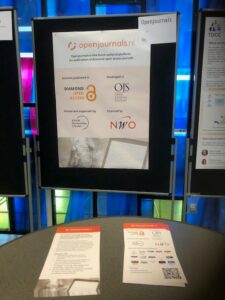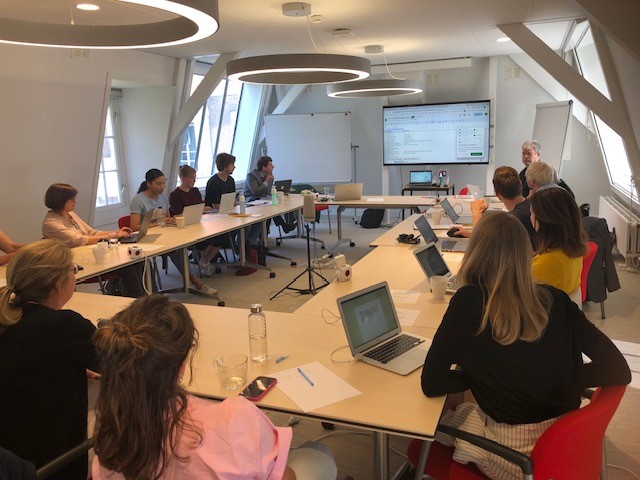Highlights OpenJournals 2024
In this post, we would like to list the main developments of Openjournals in 2024. Things are going well for Openjournals: more journals are back on the platform, technical upgrades have been made, and important organizational steps have been taken.
Journals on Openjournals
The Openjournals platform is growing, and 6 new journals were added in 2024, bringing the total to 37 journals. The new journals are:
- Sustainability Letters
- Publications de la Société Historique et Archéologique dans le Limbourg
- Nederlands Tijdschrift voor de Mensenrechten
- Noordbrabants Historisch Jaarboek
- Information Retrieval Research
- Cahier voor Literatuurwetenschap
Upgrade OJS to version 3.4
Over the summer, after an extensive testing period, a major upgrade was installed to the OJS software, the software used to host journals on the platform. The 3.4 update includes new features and enhancements that streamline the editorial process, improve the user experience and increase overall efficiency for journal administrators and managers. Editors were informed of the new features and the upgrade went smoothly.
Evaluation journal websites
This year, we conducted a project where the text and layout of all journal websites were thoroughly evaluated, and improvements and clarifications were made in consultation with editors. Outdated or incorrect information was corrected and sometimes the layout of the information was changed. As a result, the websites are now clearer and contain the information that should be on them according to DOAJ guidelines. This should make it easier to be included in indexing services such as DOAJ.
Enriched Publishing
Three so-called enriched articles were published in collaboration with BMGN – Low Countries Historical Review .These articles contain multimedia elements that describe additional information of the research. We are exploring how we can simplify this type of enriched publishing for editors and thus make it accessible to multiple editors.
Hosting costs
Openjournals is funded by a grant from NWO and is further sponsored by some universities. In addition, to balance the budget, hosting costs are charged to participating journals. In 2024, we were able to substantially reduce those hosting costs. We strive to keep those annual hosting costs as low as possible.
Openjournals User Day 2024
The second Openjournals User Day was held on Thursday, May 30, at the IISH in Amsterdam. In addition to journal editors, representatives of university libraries and policy makers were present. Together they discussed the challenges for Diamond Open Access journals. The views of research funders NWO, the Universities of the Netherlands and the UKB (cooperating university libraries and the KB) on diamond open access publishing were outlined in a panel discussion. There was also discussion on the challenges in finding funding for DOA journals, innovations in peer review and ways to attract readers and authors.
Publicity and networking
Openjournals participated in the Open Science Festival organized in Maastricht this year. Openjournals also attended the annual PKP Sprint where users and developers of the OJS software come together to work on new functionality. Part of that PKP Sprint was a meeting of major European OJS installations to exchange experiences and explore opportunities for collaboration. In addition, Openjournals regularly joins meetings of the Dutch University Publishers, where joint projects are discussed, with the goal of developing a nationwide publishing infrastructure in the Netherlands.
DOAJ and indexing services
Journals published on Openjournals are expected to meet or work toward the quality criteria of the Directory of Open Access Journals By now, 18 Openjournals journals have been accepted by DOAJ. We help the remaining journals meet the requirements and handle the registration application to DOAJ. We also help journals to be indexed at Scopus or Web-of-Science. For example, the journal Humanimalia is now indexed by Scopus, following an application by Openjournals. In addition, we regularly submit journals to DOAJ when they meet the criteria.
Memorandum-of-Understanding
A consortium of national academic parties signed a Memorandum-of-Understanding in late November in support of the national Diamond Open Access platform Openjournals. The consortium consists of the Royal Netherlands Academy of Arts and Sciences (KNAW), the KNAW Humanities Cluster, the Netherlands Organization for Scientific Research (NWO), the Universities of the Netherlands (UNL), the University Libraries and National Library (UKB), and the National Library of the Netherlands (KB). These organizations believe it is important to have a national infrastructure for publishing scholarly journals, following the Diamond Open Access publishing model. Openjournals fulfills that role, and so the partners have agreed to make a joint effort to further develop and sustain the Openjournals platform. In the coming years, as a consortium, they will be responsible for the organization and funding of the Openjournals platform and they will also mutually agree on a sustainable organization and funding of the platform from 2028 onwards.
Open Science NL
Open Science NL is the national program that promotes and accelerates the transition to Open Science. One element is the funding of projects aimed at developing digital infrastructures that support Open Science practices. Openjournals is involved in a number of ways in project proposals submitted to the Open Science NL program. A proposal was submitted to expand Openjournals to include a national infrastructure for publishing open access books. It also collaborated on a project proposal to work with university publishers to establish a nationwide publishing infrastructure for academic books and journals.
Prospect 2025
We expect to welcome another number of new journals in 2025. We will continue to provide information and webinars for editors. We want to support them even better in submitting to indexing services. Furthermore, in 2025 we expect to cooperate even more with Dutch university publishers and foreign DOA platforms.
Want to stay updated on the latest developments at the Openjournals platform and in the open access field? Subscribe to our newsletter and never miss a thing!


